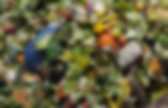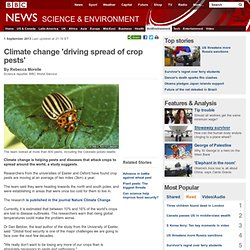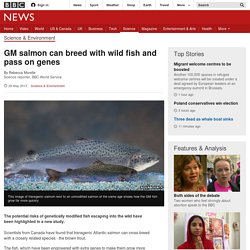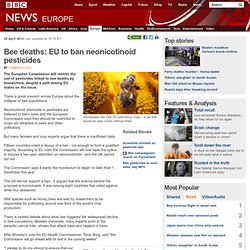

Traditional winemakers in Italy criticise competitiors. Climate change 'driving spread of crop pests' 1 September 2013Last updated at 21:10 ET By Rebecca Morelle Science reporter, BBC World Service The team looked at more than 600 pests, including the Colorado potato beetle Climate change is helping pests and diseases that attack crops to spread around the world, a study suggests.

Researchers from the universities of Exeter and Oxford have found crop pests are moving at an average of two miles (3km) a year. The team said they were heading towards the north and south poles, and were establishing in areas that were once too cold for them to live in. The research is published in the journal Nature Climate Change. Currently, it is estimated that between 10% and 16% of the world's crops are lost to disease outbreaks. Dr Dan Bebber, the lead author of the study from the University of Exeter, said: "Global food security is one of the major challenges we are going to face over the next few decades. Trade transport Continue reading the main story “Start Quote End QuoteDr Dan BebberUniversity of Exeter. Institution of Mechanical Engineers. Feeding the 9 Billion: The tragedy of waste By 2075, the United Nations’ mid-range projection for global population growth predicts that human numbers will peak at about 9.5 billion people.

This means that there could be an extra three billion mouths to feed by the end of the century, a period in which substantial changes are anticipated in the wealth, calorific intake and dietary preferences of people in developing countries across the world. Such a projection presents mankind with wide-ranging social, economic, environmental and political issues that need to be addressed today to ensure a sustainable future for all. One key issue is how to produce more food in a world of finite resources. Today, we produce about four billion metric tonnes of food per annum. Read the Global Food report [PDF, 1MB] Where Food Waste Happens Fully developed, mature, post-industrial societies, such as those in Europe, characterised by stable or declining populations which are increasing in age. Water Usage 1. GM salmon can breed with wild fish and pass on genes.
The potential risks of genetically modified fish escaping into the wild have been highlighted in a new study.

Scientists from Canada have found that transgenic Atlantic salmon can cross-breed with a closely related species - the brown trout. The fish, which have been engineered with extra genes to make them grow more quickly, pass on this trait to the hybrid offspring. The research is published the Proceedings of the Royal Society B.. However, the biotech company AquaBounty, which created the salmon, said any risks were negligible as the fish they were producing were all female, sterile and would be kept in tanks on land.
The transgenic salmon are currently being assessed by the US authorities, and could be the first GM animals to be approved for human consumption. Salmon-trout hybrids In the wild, Atlantic salmon very occasionally mate with the brown trout, successfully producing offspring. But the researchers found that in the laboratory, the genetically modified salmon could do the same. China in spotlight over mislabelled meat and poor hygiene. Bee deaths: EU may ban neonicotinoid pesticides. 29 April 2013Last updated at 10:15 ET Honeybees are vital for pollinating crops - a job that would be very costly without them The European Commission will restrict the use of pesticides linked to bee deaths by researchers, despite a split among EU states on the issue.

There is great concern across Europe about the collapse of bee populations. Neonicotinoid chemicals in pesticides are believed to harm bees and the European Commission says they should be restricted to crops not attractive to bees and other pollinators. But many farmers and crop experts argue that there is insufficient data. Fifteen countries voted in favour of a ban - not enough to form a qualified majority. The Commission says it wants the moratorium to begin no later than 1 December this year. The UK did not support a ban - it argues that the science behind the proposal is inconclusive. Wild species such as honey bees are said by researchers to be responsible for pollinating around one-third of the world's crop production.